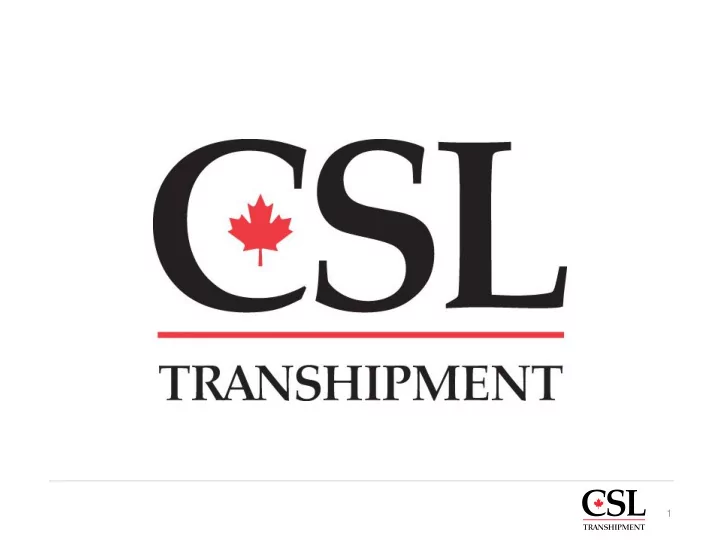

1
About CSL Benefits of Transhipment Transhipment Solutions Transhipment Evolution in the Spencer Gulf Whyalla Transhipment Where To Next Next Generation of Transhippers 2
About CSL • HISTORY 1845: The first of the original companies founded 1913: 11 shipping companies merged to create Canada Steamship Lines 2013: Centenary celebrations • CORE BUSINESS Designs, builds, owns and operates bulk material handling assets Handles nearly 100 Million tons of bulk cargo annually, including ~ 30 million tons transhipment • GLOBAL Largest owner of self-unloader vessels in the world Operations in Asia, Australia, Africa, the Americas and Europe 3
Transhipment – The Benefits A quicker route to market Less environmental impact Economies of Scale not otherwise available (up scaling to Cape vessels) Minimal Investment in Shore side Infrastructure Minimal Port Infrastructure requirements No Dredging 4
Transhipment Solutions Approach High Volume Systems Gravity based Reliably Built-for-Purpose solutions “Incremental Engineering” around proven solution – No prototyping Commitment to safety/environment 5
Transhipment Evolution in the Spencer Gulf Generation Change FOTB SPENCER GULF – 1 st Generation CSL WHYALLA – 2 nd Generation 6
Transhipment Evolution in the Spencer Gulf “2 nd Generation CSL WHYALLA” – TSV Conversion Prior to conversion Existing SUL boom replaced Cape loading boom fitted Transhipping off Whyalla 7
OUTER HARB STORAGE FACILITY TIP POCKET CC01 CC03
CSL WHYALLA – 2 ND GENERATION TSV 12000 t Deadweight 4200 tph transfer rate 9 knot speed 9
TRANSHIPPING POINTS TRANNSHIPPING POINTS IHTB Transhipping Point 1 Transhipping Point 2 TP1 Transhipping Point 3 4.5NM – OH, OHTB 5.5NM-IH LOADING BERTH INNER HARB (IH) OUTER HARB (OH) TP3 TP2 8.5NM – OH, 9.9NM- 8.5NM – OH, 9.9NM- IH IH
WHERE TO NEXT • MORE TRANSHIPPING POINTS? • DEEP WATER PORTS? 11
WHERE TO NEXT “2 nd Generation CSL Trimnes” – Next conversion 12
WHERE TO NEXT- Trimnes Conversion Plans Installation of shiploader Modification of incline boom Bridge Modification Fendering installed New auxiliary engines Bigger Bow/stern thrusters Upgraded winches Single point loading system Plastic lining in cargo holds Hold strengthening for heavy cargoes 13
WHERE TO NEXT - Transhipment Small Port Development No Pilots Fixed Loader & Conveyor No Tugs 6.5m draft Short Jetty 14
Next Generation Transhipment Shuttle Vessels 30k – 60k tonnes dwt 12k – 25k tonnes dwt Flexible Design – Built for Purpose Up to 5,000tph peak transhipment rate with a single ship-loader Environmentally friendly – zero dust Highly maneuverable with azimuth Single Point Loader system if required thrusters – no tugs required Gravity based unloading system Loading directly to Capes. Up to 10,000tph peak transhipment rate with two ship-loaders 15
NO PORT? NO PROBLEM! 16
Recommend
More recommend